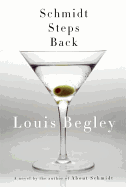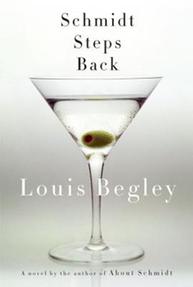
 Twelve years after Schmidt Delivered--a hiatus during which he produced two novels and nonfiction works on the Dreyfus affair and Franz Kafka--Louis Begley returns to his fascinating (if difficult to love) and most famous literary creation, Albert Schmidt.
Twelve years after Schmidt Delivered--a hiatus during which he produced two novels and nonfiction works on the Dreyfus affair and Franz Kafka--Louis Begley returns to his fascinating (if difficult to love) and most famous literary creation, Albert Schmidt.
Framed by scenes set at the cusp of the year 2009, Schmidt Steps Back quickly shifts to 1995, when "Schmidtie," as he's known to his friends, becomes infatuated with the lovely and sophisticated Alice Verplanck, a Frenchwoman 15 years his junior and the widow of his protégé and former law partner. Begley meticulously chronicles Schmidt's enthusiastic, if often fumbling, efforts to win over the younger woman while simultaneously exploring his relationships with his former lover Carrie, a Puerto Rican waitress younger than his daughter, and Charlotte, the brittle and emotionally distant daughter herself.
Schmidt's life has continuted to grow more interesting in the years since the death of his wife and his retirement from the elite Wall Street firm where he specialized in the mundane work of representing insurance companies. He heads the foundation established by his larger-than-life friend, Egyptian-American businessman Mike Mansour, a job that offers him ample European travel and a first-class lifestyle. His sexual enthusiasm can only be described as enviable for a man who's eligible for Medicare, and he lives on Long Island amid a circle of attractive and talented friends that includes a novelist and a movie producer, for whom the notion of fidelity seems as alien as some ancient tribal rite.
Begley himself spent a long career as a corporate lawyer in a prestigious New York firm not unlike Schmidt's, and didn't produce his first novel, Wartime Lies, until he was 58. Much like Louis Auchincloss, he effortlessly evokes the professional and social milieu--marked by a sense of unease that no amount of money, prestige or pleasure-seeking can satisfy--in which Schmidt moves. But where he excels in Schmidt Steps Back is in his deft manipulation of our feelings about his protagonist. One moment, Schmidt is a chilly, vaguely anti-Semitic WASP gliding through life as a smug member of the One Percent; suddenly, when he's struggling to reconnect with his estranged daughter or desperately pursuing Alice, he becomes a figure of true pathos.
It remains to be seen if Albert Schmidt will attain the literary stature of a Rabbit Angstrom or Frank Bascombe. But whether he does or not, in this and his other literary incarnations, he's a character undeniably worthy of our attention. --Harvey Freedenberg
Shelf Talker: Albert Schmidt struggles with life and love as Louis Begley returns to his most famous character.

